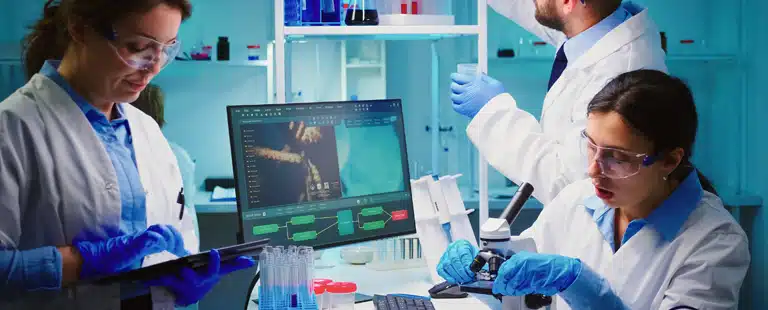
Biotechnology is rapidly emerging as one of the most dynamic and impactful fields in modern society. With its far-reaching influence across industries such as healthcare, agriculture, and environmental science, it plays a crucial role in solving some of the world’s most pressing challenges. As this industry progresses, professionals are in high demand, creating a wealth of career opportunities.
The Role of Biotechnology in Modern Industries
A Bachelor of Science in Biotechnology degree provides students with the knowledge and skills to contribute to advancements in healthcare, such as gene editing and targeted therapies. This degree enhances the precision and effectiveness of treatments. It serves as the key to acquiring a solid foundation for entering a wide range of emerging, high-demand fields.
Genetic engineering and recombinant DNA technology have led to the development of life-saving drugs, vaccines, and diagnostic tools. In agriculture, it has enabled the development of genetically modified organisms (GMOs) that are more resistant to pests, diseases, and environmental stress, leading to higher yields and more sustainable farming practices.
The Growing Demand for Biotech Professionals
The demand for skilled biotechnology professionals is experiencing an unprecedented rise, driven by technological advancements, increasing healthcare needs, and the growing focus on sustainability. As the world continues to confront challenges such as climate change, pandemics, and food security, the need for experts who can develop innovative solutions has never been more pressing.
How a Bachelor of Science in Biotechnology Can Kickstart Careers
A Bachelor of Science in Biotechnology program equips students with a solid understanding of scientific principles, preparing them to apply this knowledge in real-world contexts. The curriculum typically includes core subjects such as molecular biology, genetic engineering, bioprocessing, and bioinformatics, providing a comprehensive foundation in the field.
This strong academic background enables students to explore various applications in research, development, and production.
Such programs emphasise practical laboratory experience, allowing students to develop critical skills in problem-solving, technical proficiency, and the use of advanced laboratory equipment. Many programs also incorporate industry exposure through internships, research projects, and collaborations with leading companies.
This hands-on learning helps students gain valuable insights into the practical challenges and opportunities within the industry, better preparing them for their future careers.
Practical Laboratory Skills Development
One key objective of this program is to equip students with essential practical laboratory skills. These skills are fundamental for aspiring professionals and are integral to the program’s hands-on learning approach. Students will gain proficiency in advanced laboratory techniques, including DNA manipulation, protein analysis, and cell culture.
Through structured laboratory sessions, students will learn how to work with genetic material, manipulating and analysing DNA using techniques such as polymerase chain reaction (PCR), gel electrophoresis, and DNA sequencing. These skills are crucial for roles in genetic research, diagnostics, and pharmaceutical development.
Additionally, students will develop expertise in protein analysis, learning how to purify, quantify, and characterise proteins. This knowledge is particularly valuable for fields like drug development and bioengineering, where understanding protein structure and function is vital.
Cell culture techniques also play a major role in biotechnology education. Students will gain practical experience in culturing and maintaining cells in vitro, a critical skill for biomedical research, vaccine development, and tissue engineering. By mastering these practical laboratory techniques, students are well-prepared to tackle real-world challenges.
Why Choose Programs with Accreditation and Recognition
A well-recognized BSc. in Biotechnology program ensures that students graduate with qualifications highly valued by top global institutions and industry leaders. Prospective students must choose a program that is accredited and meets international academic and industry standards.
This accreditation not only validates the quality of education provided but also enhances the employability of graduates by ensuring their qualifications are recognised worldwide.
Reputed universities adhere to rigorous academic and professional standards, ensuring that students receive a high-quality education. The program is designed to align with the latest trends, offering students opportunities to engage with globally recognised industry practices and technologies.
Moreover, partnerships with industry organisations and research institutions further enhance the program’s relevance, offering students valuable exposure to real-world applications and boosting their career prospects. It also helps develop practical skills.
The evolving field of biotechnology offers a wealth of opportunities for individuals seeking to build impactful and rewarding careers. A Bachelor of Science in Biotechnology equips students with the skills and knowledge necessary to succeed in high-demand fields such as healthcare, agriculture, and environmental science.
A blend of theoretical learning and hands-on experience prepares graduates to enter the workforce with confidence and expertise. This field offers an exciting path toward a fulfilling and prosperous future as there’s a growing need for biotech professionals and their vast potential for innovation.


